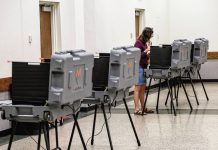
Jana Wiersema | The Republic Members of the public gather for the Bartholomew Consolidated School Board meetings Monday night at the administrative offices.
Bartholomew Consolidated School Corp. is considering using $250,000 from its operating referendum to help cover curriculum costs due to recent legislative changes that eliminate textbook fees.
Assistant Superintendent of Financial Services Chad Phillips discussed the idea during a budget work session at Monday’s school board meeting. He said there will be a public hearing on the proposed 2024 budget at the board’s Sept. 25 meeting and an adoption vote on Oct. 23.
The proposal is due to a change by the state.
“Moving forward, school corporations must provide their students with curricular materials at no cost – they are prohibited from renting curricular materials to students – however, school corporations will receive a curricular materials reimbursement amount … for all students, not only those students who are eligible for free or reduced price meals,” the Indiana Department of Education (IDOE) stated in a memo. “Accredited non-public schools will continue to receive reimbursement for students eligible for assistance.”
State law defines curricular materials as “systematically organized material designed to provide a specific level of instruction in a subject matter category, including: (1) books; (2) hardware that will be consumed, accessed, or used by a single student during a semester or school year; (3) computer software; and (4) digital content.”
During his presentation, Phillips suggested transferring $250,000 from the operating referendum fund into the educations fund to help pay for curricular material fees.
“These are the fees that were collected that aren’t textbook fees,” he said. “So if you were in a biology course and you paid, the family paid, we’ll say $11 for the consumables for that course, that did not go into the textbook fund, it had to be paid for from somewhere else. We collected those fees from families and then purchased the materials for those courses. As the legislature passed a ban on schools billing for curricular materials this year, they somewhat funded the textbook portion of the money that was needed for those curricular materials but did not, in our case, fund any of the course fees.”
Over the last three years, course fees have averaged about $250,000 annually, he said.
IDOE said in its memo that the department is annually required to determine an average per-student cost amount for curricular materials. The amount is determined by dividing the total curricular material costs reported by all schools, including eligible non-public schools, by the sum of the total enrollment reported by school corporations plus the total number of eligible students non-public schools sought reimbursement for.
According to Chalkbeat, the state budget now includes an annual $160 million line item to help reimburse schools for curricular costs.
If the total curricular material costs reported by all schools exceeds $160 million, IDOE will divide the total appropriation by the total number of students eligible for reimbursement, department officials said.
School corporations will receive one annual lump sum payment each fiscal year to go toward curricular costs. IDOE expects to provide the payment in December, with all schools receiving the same per-student amount regardless of the actual costs reported.
Phillips said that while school officials are not sure how much BCSC will receive, they’re estimating a $1.4 million payment.
He added that he is concerned about how long it might take the state to address issues with its reimbursement amounts.
“This is not a budget year for the legislature this spring, so they’re not likely to open the budget up and say, ‘OK, we need to fully fund that curricular material line items,’” Phillips said. “So it’s at least a two-year expenditure, and we don’t know if or when it would get fixed after that. So it may be something we’re looking at for the long term.”
In discussing the proposed transfer, he said that the education fund is the most appropriate fund for the expense, and the only sources the school corp. can transfer dollars from are the operations fund, the referendum fund or the rainy day fund.
The operations fund is not appropriate because is fund is “explicitly for the operations of the district,” such as transportation, technology and capital improvements, he said.
While they could use the rainy fund, he noted that, “That money is not getting replenished from anywhere. … the rainy day fund does not have revenues that come into it every year. It’s a fixed amount of money that we set aside for an emergency.”
The fund has a balance of a little over $6.27 million, which is enough to cover about two payroll cycles.
On the other hand, Phillips said that the operating referendum has a “consistent source of revenues” and would be allowed to transfer the funds for this expense.
“We are collecting more money than we are expending from that each year,” he added.
However, he did acknowledge that curricular costs were not included in the referendum when it was passed.
In June of 2020, 61.33% of voters answered “yes” to a ballot question that asked if they would be willing for BCSC to impose an additional property tax rate not exceeding $0.1560 on each $100 of assessed value “for the purpose of increasing compensation for teachers and support staff and maintaining student safety.”
The referendum lasts for a total of eight years, and officials have said in the past that the community would likely vote on its renewal in 2028.
This isn’t the first time that BCSC officials have proposed using the referendum operating fund for costs not included in the original question. Since 2022, the school corp. has also used the fund to cover salaries and benefits for teachers in its K-12 stem labs.
The board initially voted in February 2022 to approve using $160,000 in additional appropriations from the operating referendum fund to help support STEM lab expenses in the fall of 2022, as the district was converting the elementary labs into a “specials” rotation, similar to art or physical education, with certified teachers. The change has also been supported by Tax Increment Financing funds granted by the city of Columbus.
“These operating referendum funds are revenue collections in excess of the budgeted amount that we have projected for the eight years of the referendum, and that’s due to an increase in assessed value,” Phillips said at a previous meeting. “And so we’re able to apply the 15.6 cent rate but collect more than what we have budgeted to spend for this calendar year.”
The Department of Local Government Finance also made a small error on the amount of miscellaneous revenues calculated on excise taxes, so these were left out of the budgeted amount, he added.
Under the proposed 2024 budget for the referendum fund, the amounts allocated to teacher and support staff salary and benefit increases would stay level, at $5.3 million for teacher increases and $1.45 million for staff.
The proposed transfer does not take funds away from these items, Phillips said.
“Our commitments to those dollar amounts haven’t changed,” he said. “And there will be years, including 2023, where we will spend more on that line that what we budgeted from. And I think that’ll be the case in this calendar year, certainly on the teacher line. I’m not sure if we’ll be close on the support staff line. So as long as we continue to hire people, and they continue to reach those milestones of five years and 10 years and 15 years, we’ll continue to fund those even if it exceeds that amount.”
However, some board members had questions and concerns about the proposal.
“The referendum was a commitment to the community,” said board member Logan Schulz, who wondered if there might be other ways to accommodate the expense.
Todd Grimes, who is a teacher in the Greenfield-Central Community School Corp., said that while dollars are increasing in the fund, the money could “arguably be divvied up” toward further support for teacher and staff increases.
BCSC is set to begin formal collective bargaining with its teachers’ union, the Columbus Educators Association, on Sept. 20, said board president Nicole Wheeldon.
The two parties held a 4 p.m. public hearing Monday to take testimony prior to the start of bargaining. Several teachers spoke during the session, expressing concerns about the school corporation’s current level of pay as well as the proposal to use referendum funds to cover curricular materials.
“We have teachers that count on that referendum money,” said Columbus North High School academic coach Victoria Shireman. “While we understand it is not part of our base contract and it is just extra, we have teachers that that referendum money is the difference between being a teacher and being a teacher and also having a second job, having a third job.”




